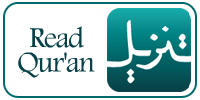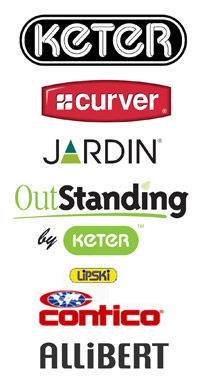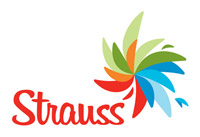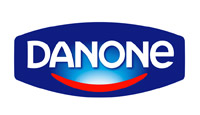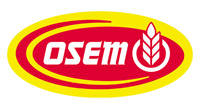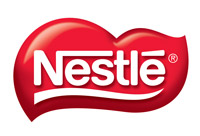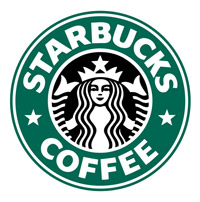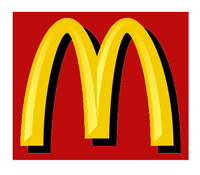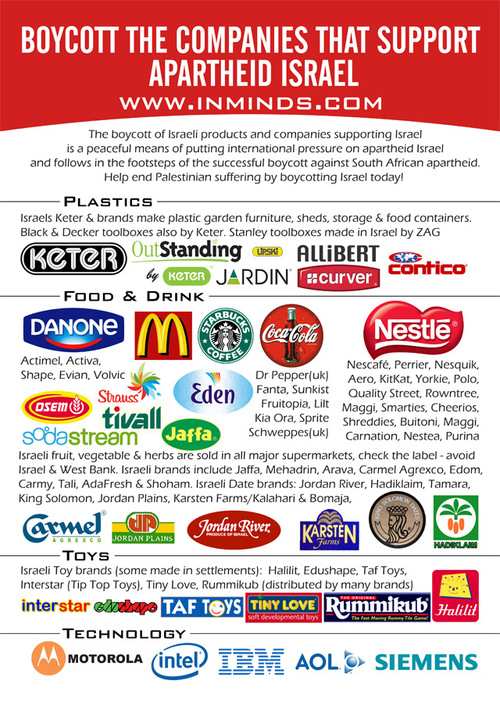

PLASTICS
Keter
Israels Keter Group is one of the world’s leading manufacturers and marketers of plastic consumer products. The Israeli plastics giant is privately owned by the Sagol family, and has a turnover of .1 billion, 90% of which is derived from overseas sales.
Its product range includes garden furniture, outdoor storage solutions and sheds, shelving systems and utility cabinets, tool boxes and storage products for the DIY market, household products, baby and toddler products.
Its brands, subsidiaries, and sister companies (all owned by the Sagol family) include 'OutStanding Solutions' (Keter garden storage), Lipski (plumbing accessories), Allibert (bathroom accessories), Curver (plastic home & food storage), Jardin (garden furniture), and Contico Europe (plastic storage boxes). Keter products are also sold under the Black & Decker, B&Q and Homebase brands.
Whilst the profits end up in Israel, not all the products are produced in Israel, for example Allibert has factories in France & Belgium, whilst Curver has factories in Poland & Hungary. Keter has 12 factories in Israel, 2 of which are in the illegal settlements.
Stanley toolboxes are also made in Israel by Israeli plastics company ZAG (90% owned by Stanley).
For more information see the Shopping Can Kill campaign.
FOOD & DRINK
Strauss
The Straus Group is Israels second largest food company with a turnover .8 billion in 2010 and 13,500 employees operating twenty-five production sites in twenty-one countries around the world. Its brands in the USA include Sabra (hummus dips) and Max Brenner (chocolate cafes). Strauss Coffee is currently the fifth-largest coffee company in the world, dominating the central and eastern European markets (Doncafe) as well as Brazil.
The Strauss Group on its website, on the page on "Corporate Responsibility - Community Involvement" reveal their deep rooted support for the Israeli army, and in particular the infamous Golani platoon, known for its brutality, which the Strauss group has "adopted" for over 30 years.
Danone
In July 1998 Danone opened its R&D facility in Israel - the Danone Insitute, and later the same year in October 1998 Mr. Franck Riboud, on behalf of Danone received the Jubilee Award by the Israeli Prime Minister Netanyahu.[Jubilee Award]
Danone owns a 20% share of Israel's second largest food company, the Strauss Group. Danaone Israel is the hub supplying Danone products to the whole Middle-East including Turkey, Greece, Egypt and Jordan.
Tivall
Israeli food company Tivall is one of the world's leading suppliers of meat-substitute products. It has a turnover of million and has 451 employees[59] It has a manufacturing base at Kibbutz Lochamei Hagetaot in Northern Israel, and a new facility in the Czech Republic.
Tivall brand products can mainly be found in health food stores - their website mentions Holland & Barrett, Fresh & Wild, and Planet Organic. But most of their sales are through the supermarkets who rebrand Tivall products as part of their own frozen "Meat-free" range. This includes Tesco, Asda, Morrisons and Sainsbury's. Morrisons also stocks Tivall brand Frankfurter. Waitrose online site Ocado sells a full range of Tivall products.
Osem
Osem is Israels 4th largest food & beverages company (by turnover) after Tnuva, Strauss and Coca-Cola. It has a turnover of 2 million and nearly 5000 employees with 14 factories in Israel.
Its brands include Beit Hashitah (pickles), Of Tov (frozen meat products), Habait (ready made cakes) and Sabra Salads (ready-made salads and spreads). Osem also owns 58% of meat-substitute manufacturer Tivall Foods.
According to Osem's website its products are sold in Marks & Spencer, Tesco, Sainsbury and Morrison, with each store marketing them under their own label. Waitrose online site Ocado sells a range of Osem products from soups, crackers and croutons. Tesco online sells a range of Osem cakes.
In April 2009, Osem UK announced its acquisition of Yarden GB. Yarden GB's product range includes chilled meats and Yarden wines from the Golan Heights Winery, located in Katzrin on the occupied Syrian Golan Heights. Golan Heights Winery exports 38% of all Israeli wines, its wine brands also include Gamla and Golan. According to Yarden GB's website its products are available in Tesco, Asda, Sainsbury, Morrisons, Budgens, Somerfield, Waitrose and Harrods. Waitrose online site Ocado sells a range of Yarden meat and houmous products.
Nestlé
Nestlé is the world's largest food company, it owns 53.8% share of leading Israeli food manufacturer Osem, an investment worth over 0 million.
In 1998, Mr. Peter Brabeck-Letmathe on behalf of Nestle, received the Jubilee Award by the Israeli Prime Minister Netanyahu [Jubilee Award]. Following the award in June 2002 Nestle opened its Research & Development Centre in Israel, in Sderot. And since then it has steadily increased its investment in Israel, its initial 10% stake in Osem has now grown to a controlling 53.8%. Nestle also owns Nespresso Israel Ltd in Tel Aviv which supplies coffee brewing equipment. In 2010 Nestle acquired a 51% stake in Israeli babyfood company Materna Laboratories for million.
Nestle has 9 factories in Israel, which after China(18) and Russia(11) is the highest number in any country in Asia - disproportionately high when one considers its size and population. And in May 2011, Nestle announced plans to build another factory in Israel, an ice cream plant worth million.
Nestlé also owns 30% stake in L'Oréal, another company on the boycott list.
Coca Cola
A detailed account of Coca-Cola's links to Israel is provided here:
http://www.inminds.com/boycott-coca-cola.html
A summary:
From 1966 Coca-Cola has been a staunch supporter of Israel. In 1997 the Government of Israel Economic Mission honored Coca-Cola at the Israel Trade Award Dinner for its continued support of Israel for the last 30 years and for refusing to abide by the Arab League boycott of Israel.
Every year Coca Cola bankrolls the American-Israel Chamber of Commerce Awards which honors companies that have contributed most to the Israeli economy. In 2009 a Coca-Cola sponsored award went to Israel’s Lobby AIPAC for its successful lobbying of the Senate to reject of the UN call for "immediate ceasefire" and endorse the continuation of the Israel military assault on Gaza.
In 2008 Coca-Cola tasked the Israeli venture capital Challenge Fund to locate suitable investments in Israel with a promise of "a blank cheque” . This agreement is exceptional in the Israeli venture capital industry.
In 2009 Coca-Cola hosted a special reception at the Coca-Cola world headquarters to honour Brigadier-General Ben-Eliezer. Ben-Eliezer is a wanted war criminal, during the Six-Day War his unit was responsible for the execution of over 300 Egyptian POWs. Under Sharon, Ben-Eliezer served as Defence Minister presiding over the massacre at Jenin.
For the past two decades, nearly every year, Coca-Cola has sponsored the JCC Maccabi Games whose stated aim is to cultivate Jewish youth in an informal setting to "encourage their identification with the state of Israel". As part of this, Coca Cola has sponsored young children to visit Israeli military bases and spend time with war criminals in order to engender empathy, in their own words "visit an air force base.. talk with the pilots that are the elite Israel Defense Force units..meet fighters of the army.".
Coca-Cola Israel, Israel's third largest food & beverages company, owns dairy farms in the illegal Israeli settlements of Shadmot Mechola in the Jordan Valley and a plant in the industrial zone of Katzerin in the occupied Golan Heights.
Eden Springs
Eden Springs is an Israeli water cooler company that in Israel steals water from the Salukia spring in the the illegally occupied Syrian Golan Heights. This is in violation of UN resolution 242 and Article 55 of the Hague Regulations which specify that you cannot acquire territory by war and that you cannot plunder the natural resources of occupied territory. To clarify, the water in Eden Springs Coolers found in the UK is sourced locally, but the profits go back to Israel to finance its illegal activities.
Sodastream
SodaStream is an Israeli company manufacturing and distributing home carbonating devices and flavorings for soft drinks. The company’s main plant is located in the industrial zone of Mishor Edomim which is an illegal Israeli settlement in the West Bank. Kav LaOved, the NGO committed to protecting the rights of disadvantaged workers in Israeli companies, has reported that SodaStream factory workers, in particular Palestinians, are paid less than half the minimum wage and has described the working conditions in the factory as "one of the worst", with workers being fired if they complain of the conditions.
SodaStream brands include: SodaStream, Soda-Club, AlcoJet, Sprudelino, Aquabar, Gazoz, Aquafizz, Aquabubbler, Penguin, Sodamaker, Fountain Jet and Edition1. Its products are available in Argos, Asda, Comets, Currys, Harvey Nichols, Homebase, John Lewis, Robert Dyas, Selfridges and House of Fraser.
Starbucks
Howard Schultz, the founder, chairman, president and chief executive officer of Starbucks who also owns 31.6 million shares of Starbucks stock (worth around .4 billion in Nov 2011) is an active zionist.
In 1998 he was honoured by the Jerusalem Fund of Aish HaTorah with "The Israel 50th Anniversary Friend of Zion Tribute Award" for his services to the zionist state in "playing a key role in promoting close alliance between the United States and Israel". The ultra-right wing Jerusalem Fund of Aish HaTorah funds Israeli arms fairs chaired by the butcher of Jenin, General Shaul Mofaz, and the zionist media pressure group honestreporting.com, they were also implicated in the production and distribution of the infamous islamophobic film 'Obesession'. Starbucks proudly displayed the award on the company's website under the section of 'awarda and accolades' the Starbucks company has won, however, once the boycott started to bite the award mysteriously disappeared from its website.
Howard Shultz work as a propagandist for Israel has been praised by the Israeli Foreign Ministry as being key to Israel's long-term PR success. On April 4th 2002, whilst the Israeli army was slaughtering Palestinians in Jenin Howard Shultz made a provocative speech blaming the Palestinians, suggesting the intifada was a manifestation of anti- Semitism, and asked people to unite behind Israel. Starbucks also sponsors fund raisers for Israel.
At a time when other businesses were desperately pulling out of Israel, Starbucks decided to help Israel's floundering economy and open Starbucks in Israel. The venture failed but Shultz has vowed Starbucks will “return to Israel in due course”.
Starbucks has opened outlets in US bases in Afghanistan and Iraq, and at the illegal torture centre in Guantanamo Bay. Customer Relations say "Starbucks has the deepest respect and admiration for U.S. military.. who risk their lives to protect Americans and our values of freedom and democracy". Petty Officer Barry Tate who is serving in Guantanamo Bay agrees that Starbucks is helping "lift the morale" of the guards and interrogator's at Guantanamo Bay.
McDonald's
McDonald's Corporation is a major corporate partner of the Jewish United Fund and Jewish Federation. According to the Jewish United Fund, through its Israel Commission it "works to maintain American military, economic and diplomatic support for Israel; monitors and, when necessary, responds to media coverage of Israel". The Jewish United Fund also runs "Fun-filled Summer Family Missions to Israel" where families get to "visit an army base and meet with Israeli soldiers" and "visit our sister city, Kiryat Gat and see the important work we are doing there". Kiryat Gat is built on stolen Palestinian land - the lands of the villages of Iraq Al Manshiya and Al-Faluja whose residents were ethnically cleansed in 1949 in contravention of International Law. Through its "Partnership to Israel" programme, the Jewish United Fund provides .3 million annually to help further settlement and development of Kiryat Gat. The Jewish Federation, through its Israel Action Network is tasked to fight "efforts to boycott Israeli products" and "campaigns, such as equating Israel with apartheid South Africa".
Another way McDonald's supports the Jewish United Fund is by running a partnership scheme whereby they will match any donation an employee make to the Jewish United Fund with its own equal size donation.
McDonald's first restaurant in the Middle East was in Israel, opened in 1993, since then it has 160 restaurants in Israel (1996) with a 60% market share, employing around 4000 Israelis. Since April 2009 McDonald's has also opened 15 branches of McCafe chain in Israel, with plans to open 10 new branches every year.
McDonalds discriminates against its Arab workers, in 2004 it sacked an Arab worker in Israel because she was caught speaking arabic to another Arab employee. Arabic, along with Hebrew, is the official language of Israel spoken by 20% of the population.
According to the American Jewish Committee (AJC), whose Executive Director "regularly meets with Israeli Prime Minister Benjamin Netanyahu", McDonald's in July 2001 immediately pulled an advertising campaign in Egypt when the ADC contacted them to complaint that the singer featured in the advert had in the past performed a song critical of Israel. Within 24 hours of the complaint, the advert was cancelled and according to the Egyptian franchise of McDonald's "all copies of the tapes were whisked 'back to the main offices'"!
Israeli Fresh Produce
In 2010 exports of Israeli fresh agricultural produce was worth .41 billion and most of it, some 87% was exported to Europe (UN Commodity Trade Statistics). Fruit, vegetables and herbs grown in Israel and on its settlements in the West Bank can be seen on sale at all the major supermarkets and greengrocers. Always check the label - avoid Israel and West Bank.
Until recently the main player was Israeli state owned company Carmel Agrexco, responsible for about 60-70% of all Israel’s agricultural exports. But in September 2011 Agrexco went bankrupt. This was due in part to fact that Agrexco has been the target of a sustained international boycott campaign. It has been recently reported that the Israeli Bickel Export Group has acquired Agrexco with plans to revive it in 2012 (target sales 50 million euros).
With the privately owned Israeli company Mehadrin Tnuport Export (MTEX) set to take Agrexco’s place as Israel’s biggest agricultural exporter the focus of the international boycott campaign is now firmly on MTEX with actions already having taken place (Nov 2011) outside its UK headquarters in Borehamwood and its French headquarters in Chateaurenard.
MTEX is Israel’s largest grower and exporter of citrus fruit responsible for 65% of overseas sales of Israel's most recognisable brand on the supermarket shelves - JAFFA. They supply most of the supermarkets including Tesco and Sainsburys. MTEX ownes 50% of Miriam Shoham Ltd whose mangoes and pomegranates are available in Tescos and Asda.
Hadiklaim, the Israeli Date Growers Cooperative, which includes illegal settler plantations in the Jordan Valley, sells 65% of all Israeli dates. Its dates have brand names King Solomon, Jordan River, Tamara, Karsten Farms / Kalahari and Bomaja. Agrexco date brands include Jordan Plains and Jordan Valley.
Most supermarkets sell fresh herbs sourced from the illegal Israeli settlements on the West Bank. These include basil, sage, chives, rosemary, parsely, sorrel, marjoram, mint, thyme and tarragon. They are labelled 'West Bank' or 'Israel'. 'West Bank' never refers to Palestinian goods as they don't make it past the military checkpoints. Often settlements goods are labelled 'Produce of Israel' to avoid payment of tariffs when entering the EU - according to the EU-Israel Association Agreement goods produced outside the recognised borders of Israel (ie on the Israeli settlements on the Palestinian Occupied Territories) are not exhempt from import duties. A July 2008 Channel 4 news report revealed herbs grown on the illegal No'omi settlement on the West Bank, destined for the UK, were being mislabelled 'produce of Israel' in breach of the EU-Israel Association Agreement.
Other Israeli fresh produce brands to avoid include Edom (peppers, tomatoes and mangoes), Carmy (sweet potatoes), AdaFresh (herbs), Arava (peppers, Tomatoes, herbs) and Tali (table grapes).
..Information on other companies to follow shortly..
Frequently Asked Question
Why so many companies?
Our strategy is to have a focused campaign where individual Israeli companies are targeted wherever possible rather than wide boycotts of whole stores. This means that whilst there are more brands on the list, they are actually easier to boycott. So for example whilst B&Q and Homebase are major sellers of Israeli plastic giant Keter's products we are calling for a focused boycott of each Keter related brand - OutStanding, Lipski, Jardin, Allibert, Curver and Contico, rather than a blanket boycott of these stores.
Why are some of the brands in the previous Boycott Israel Campaign missing from this campaign?
Over time many companies have reconsidered their support for Israel and some have divested from Israel due to many reasons including the accumulated pressure of the boycott. These changes are reflected in the new card.
Disney
Disney, working with the Israeli embassy, was given 1.8 million dollars by Israel to promote Jerusalem as the capital of Israel at a special exhibition at its Epcot centre in Florida, strategically positioned so that every visitor to the centre would have to walk through the exhibition in order to reach the exit. Jerusalem is an illegally occupied Palestinian city and under international law can NEVER be the capital of Israel. The exhibition has since been removed so Disney is no longer on the boycott list.
Sara Lee
Sara Lee has divested its large stake in the Israeli textile giant Delta Galil so it along with its two dozen plus brands have all been removed from the boycott list.
Nokia
Nokia Ventures Organization which had so heavily invested in Israel is no longer part of Nokia and is now called BlueRun Ventures and has many investors now. Note that Nokia is still one of its investors, but its stake in Israel is now no more prominent than countless other technology companies who are not on the boycott list, so Nokia has also been removed from the list.
Arsenal FC
Following a concerted campaign, Arsenal Football Club's contract with the Israeli Tourism board to promote Israel as the teams "official and exclusive travel destination" on its digital perimeter boards (to an estimated 700 million viewers in 198 countries) was not renewed. Subsequently, Arsenal FC has been removed from the boycott list. Note that Arsenal still runs 'Arsenal in the Galilee' coaching project in Israel.
Selfridges
Selfridges flagship store in London was picketed for stocking a range of settlement products including Ahava and soon a boycott of the store followed. It no longer sells Ahava Dead Sea products on its website, although it does advertise Estee Lauder Origins 'body scrubs' which include Dead Sea salts. As part of our strategy of a more focused boycott campaign where individual Israeli brands like Ahava are targeted, Selfridges in no longer on the boycott list.
Danone
Whilst Danone is still on the boycott list, it has gone through some changes and lost some of its famous brands and these are no longer on the boycott list. Jacob biscuits is now owned by United Biscuits; HP foods and Lea & Perrins is now owned by H.J. Heinz; and similarly Galbani and LU Biscuits are also no longer owned by Danone.
What is the Boycott Israel card and how can I get one?
The Boycott Israel card is a handy sized card listing the companies that give support to apartheid Israel. The card is designed to be carried in your wallet or purse so that when you are out shopping you know what products to avoid.
http://www.inminds.com/boycott-brands.html


